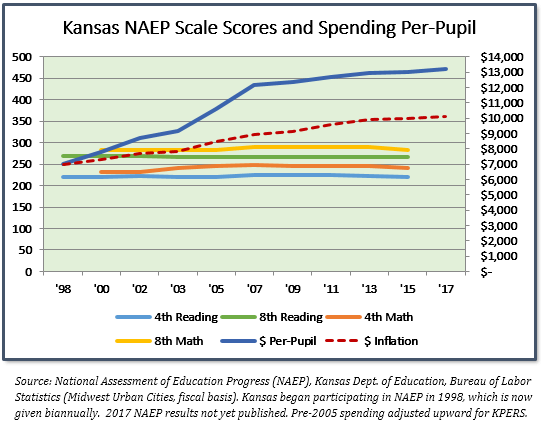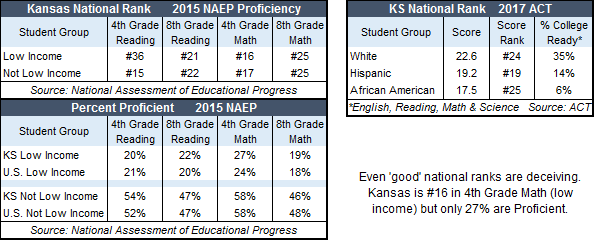Dramatically better student achievement is key to the future of Kansas, but sadly, the education lobby and their taxpayer-funded lawyers believe money is what matters. They want parents to believe that simply meeting their financial demands with huge tax increases will magically improve outcomes and they don’t let facts get in their way. A recent commentary by Kansas Association of School Boards president Dayna Miller (“School funding is key to the future of Kansas”) proves this point and demonstrates willful ignorance of the real education crisis.
Here are the facts from the Kansas Department of Education, National Assessment of Educational Progress (NAEP) and ACT.
In 1998, 34 percent of Kansas 4th graders were Proficient in Reading on NAEP and 36 percent of the 8th graders were Proficient; 17 years later, both grades were at 35 percent Proficient with funding $3 billion higher and 28 percent above inflation.

Only 29 percent of Kansas students taking the 2017 ACT test were considered college-ready in English, Reading, Math and Science. The 2017 state assessment shows only 11 percent of low income 10th graders are on track to be college and career ready in Math, and just 34 percent of their more affluent peers.
KASB never mentions actual achievement levels, which would naturally beg the question of whether outcomes are acceptable and allow parents to see that large funding increases haven’t caused achievement to improve.
They also claim “Kansas ranks 10th in the nation across a wide spectrum of student measures,” even though Kansas doesn’t have a single top ten ranking on NAEP or ACT; rankings range from the mid-teens to the mid-thirties. The basis of their claim is a proprietary formula that counts some data twice and includes things that don’t measure actual achievement levels, like a high school graduation rate.

The truth is that Kansas is about average in a nation that doesn’t do all that well.
Are teacher salaries low and not keeping up with inflation? Yes, but those are choices made by local school boards. A recent national analysis of that trend shows Kansas teachers could be making over $13,000 more per year if local school boards hadn’t added so many extra non-teachers.
The facts simply don’t support the education lobby’s demand for upwards of $1 billion more and citizens are overwhelmingly opposed to tax increases for more school funding. Citizens want the constitution changed so courts can’t force spending and tax increases; they want schools held accountable for improving outcomes and a school funding formula that requires efficient and effective spending. The education lobby is completely out of step with most Kansans on these issues and those who don’t agree with them are accused of being anti-education.
Spending more on schools isn’t the key to Kansas’ future, and many legislators privately acknowledge that simply spending more money doesn’t cause outcomes to improve. So when they return to Topeka next week, they have to decide whether to satisfy the court and education lobby’s demand for upwards of $1 billion more per year (knowing that doing so won’t really help kids) or risk re-election challenges for standing up for students and voters.



